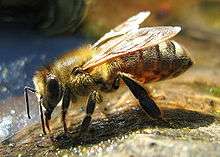Melittology
Melittology (from Greek μέλιττα, melitta, "bee"; and -λογία -logia) is a branch of entomology concerning the scientific study of bees. It may also be called apicology. Melittology covers the species found in the clade Anthophila within the superfamily Apoidea, comprising more than 20,000 species,[1] including bumblebees and honey bees.

A honeybee drinking water
Subdivisions
- Apiology – (from Latin apis, "bee"; and Ancient Greek -λογία, -logia) is the scientific study of honey bees. Honey bees are often chosen as a study group to answer questions on the evolution of social systems.
- Apidology is a variant spelling of apiology used outside of the Western Hemisphere, primarily in Europe; it is sometimes used interchangeably with melittology.
Melittological societies
Melittologists and apiologists are served by a number of scientific societies, both national and international in scope. Their main role is to encourage the study of bees and apicultural research
- International Bee Research Association
- National Bee Association of New Zealand
- British Beekeepers Association
- German Beekeepers Association
- Federation of Irish Beekeepers' Associations
Melittological journals
- Apidologie
- American Bee Journal
- Journal of Apicultural Research
- Journal of Melittology
gollark: Shouldn't it be kHz?
gollark: And if you just want to scrape the site's HTML to get information, tough; the class names are seemingly deliberately obfuscated, there's no semantic HTML, and a lot of stuff is paginated (which admittedly is fine for actual browser use).
gollark: It seems to me as if it's deliberately designed to make third-party stuff as annoying as possible. The examples are all for PHP, it uses a weird system[1] instead of fairly standardized HTTP response codes, there are some special cases (-2 and -1 on hoursleft on a dragon) which are a bit weird, and the API keys are request-only. I emailed TJ09 asking for one and got no response (EDIT: oops, there's a request form. Either I missed that or it was added recently.)
gollark: It's a shame the DC API isn't more, well, usable. There could be loads of cool stuff like that made.
gollark: I think I saw an inbreeding coefficient calculator at some point.
References
- "Bees - Facts About Bees - Types of Bees - PestWorldforKids.org". pestworldforkids.org. Retrieved 2016-04-26.
This article is issued from Wikipedia. The text is licensed under Creative Commons - Attribution - Sharealike. Additional terms may apply for the media files.